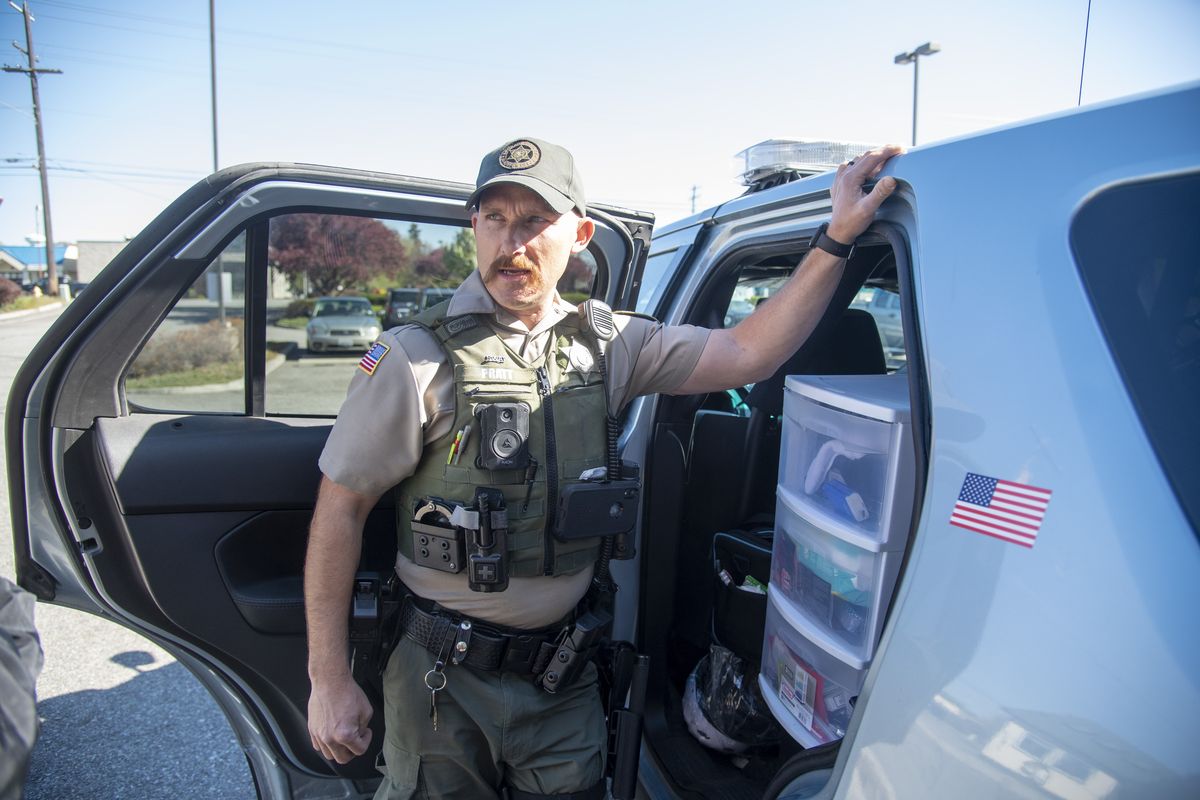Spokane Valley deputy strives to help homeless people with basic needs so they can get long-term boost

Deputy Joshua Pratt bent down to speak to a man and woman experiencing homelessness in a forested area near Interstate 90 Wednesday morning.
Between gulps from a plastic bottle of liquor, the woman indicated she wanted to go into substance abuse treatment but couldn’t drive her car she had been living out of.
Pratt and his partner, Amanda Boyer, an outreach specialist from Spokane Valley Partners, began putting together the “puzzle of life,” that would allow the woman to get into treatment right then and there, without having to worry about her car.
“We don’t want a car to be the reason they’re not getting clean,” Pratt said.
Puzzling together a plan for people on the streets of Spokane Valley takes up most of Pratt’s time as the homeless outreach deputy for the Spokane Valley Police Department.
Pratt’s constant patience and willingness to go above and beyond led Chief Dave Ellis to nominate him to be the Lilac Festival Association’s Deputy of the Year, an honor he will be recognized for later this week during the organization’s gala and subsequent parade.

Pratt, 39, moved to Spokane Valley about three years ago after more than a decade as a deputy in Los Angeles County.
Once in Spokane Valley, he worked patrol and then as a school resource deputy before the department decided to bring back its bike unit last summer.
Pratt thought the new summertime role would be a great excuse to get outside, he said. The bike unit patrols the Valley’s trails and parks, where homeless people often camp.
He began connecting frequently with people who are homeless and had “some success” helping them into a shelter or the county’s stabilization center, Ellis said.
That success, along with a desire to cultivate a more proactive approach to dealing with the homelessness crisis, led the Valley to create the homeless outreach position last fall, Ellis said.
Now, Ellis juggles radio calls, reports of homeless encampments filed online, and direct calls from business owners and people living on the streets.
He usually starts by meeting people’s basic needs, giving them food, socks, gloves, or whatever else he has stored in his patrol car.
“I feel like once we address some of those immediate concerns, you know, someone being cold or hungry, then we can break down to some of the other stuff, more long-term stuff,” Pratt said.
Often Pratt tries to refer someone to services immediately, offering them a ride to a shelter or the county’s stabilization unit. During the first quarter of the year, Pratt took 14 people to the stabilization unit, where they can begin addiction treatment and get help for mental health issues.
It’s a strike-while-the-iron-is-hot situation, he said.
Pratt has to juggle complaints by business owners of people sleeping or leaving trash on their property and the lack of places for people who are homeless to go, especially because there is no homeless shelter in Spokane Valley.
“If you’re displacing them, where are they going to go?” Pratt said.
Despite the constant juggling of needs, Pratt has had success over the eight months in the position.
He contacted one man who was living in his RV and offered some support, the next day the RV burned down.
Pratt rushed out to the scene and was able to get the man into a hotel. When he checked on him the next day, the man mentioned he had a job interview coming up that week but nothing to wear after losing everything.
Pratt went home and grabbed a dress shirt, bought some pants, and shoes and made sure the man made it to his interview, Ellis said. He got the job and into stable housing, Pratt said.
He has “really gone above and beyond what the job requires,” Ellis said.
Part of what makes Pratt good at his job is knowing when to bow out, Pratt said.
Often people experiencing homelessness have a difficult history with law enforcement, he said.
“I have to understand I might not be the best person for that situation,” Pratt said.
That’s when he relies on Boyer to step in and sort things out. Boyer said Pratt has put in the time to develop good relationships with people on the street and maintains a positive outlook no matter how frustrating a situation.
“If you’re going to be out here engaging with these individuals, you know, positive, negative whatever that is you have to have the heart for it,” Boyer said.
Pratt’s focus isn’t on enforcement, he often doesn’t arrest for misdemeanors, instead hoping to focus giving the person a launching pad to improve their life.
“A lot of it I think is really just having some empathy for the situation,” Pratt said. “I think at the end of the day a lot of people just want to be treated like human beings. So, you know, I tell people, ‘Hey, I put my pants on the same way as you in the morning.’ ”